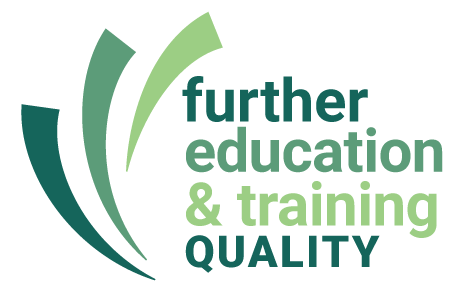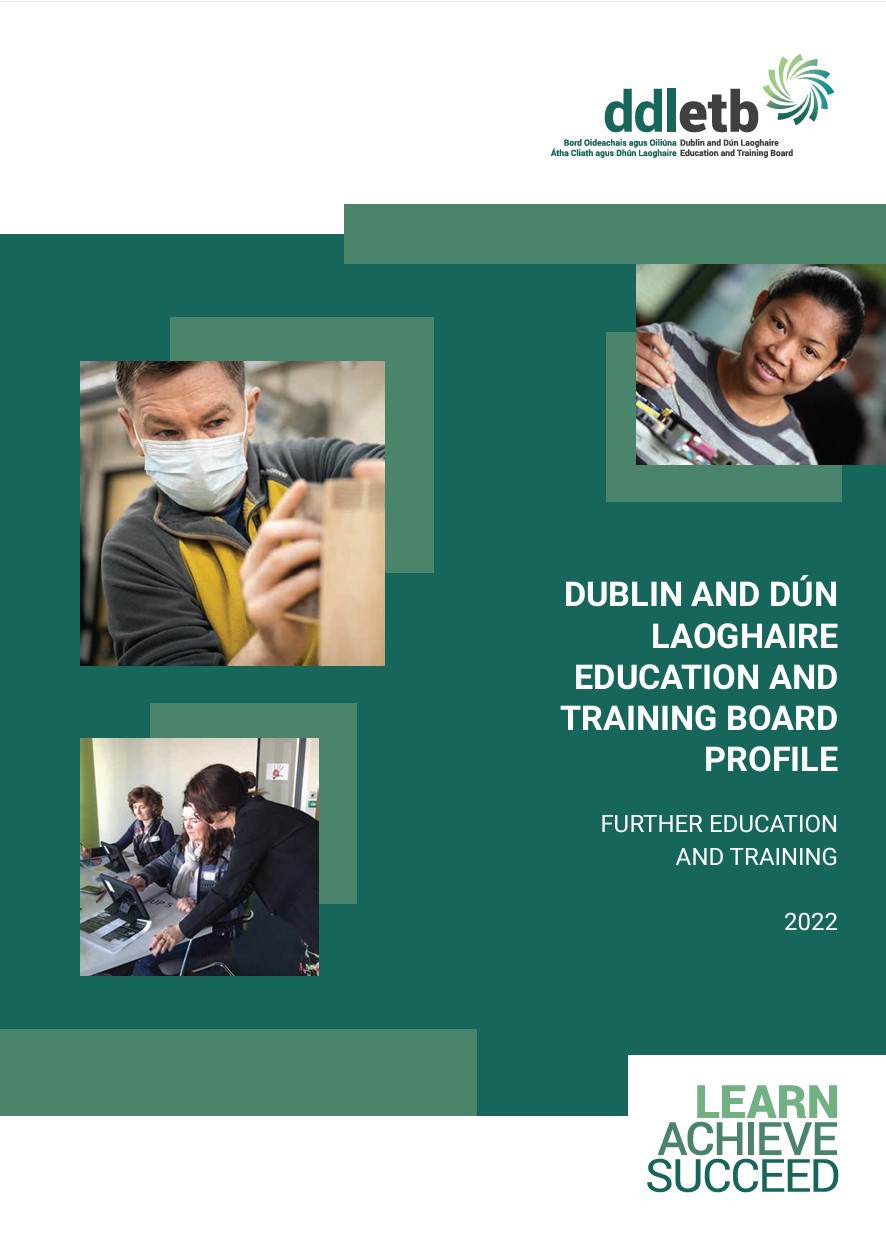Introduction: Quality Assurance In DDLETB
Dublin and Dún Laoghaire Education and Training Board’s Further Education and Training Services
Dublin and Dún Laoghaire Education and Training Board (DDLETB) is one of 16 ETBs which were established under The Education and Training Boards Act, 2013. Following ministerial approval, County Dublin Vocational Education Committee (VEC) and Dún Laoghaire VEC were dissolved on 1st July 2013, and the Dublin and Dún Laoghaire Education and Training Board was officially established, encompassing the catchment area of the two VECs. Three (3) former FÁS Training Centres (Baldoyle Training Centre, Tallaght Training Centre, and Loughlinstown Training Centre) were initially transferred to SOLAS and were then amalgamated with the new Dublin and Dún Laoghaire Education and Training Board in January 2014.
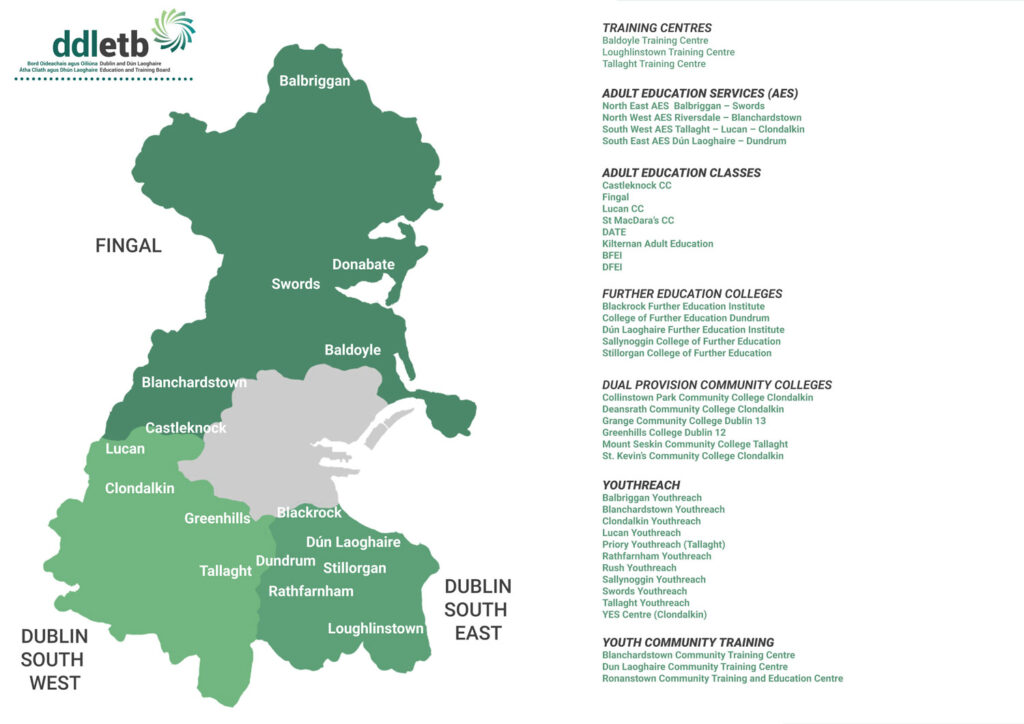
1 – Overarching Institutional Approach to Quality
Culture of Quality: Keeping the Learner at the heart of all we do
To access the DDLETB Statement of Strategy 2022-26, please click here.
Dublin and Dún Laoghaire ETB’s Further Education and Training (FET) services are committed to embedding a culture of quality across all levels and across all services of the ETB. This commitment is underpinned by three principles: that of keeping the learner at the heart of all that the ETB does, that of inclusive, cross-service representation in all governance units and finally, a consultative, cross-service approach to all development of policies and procedures.
DDLETB’s FET services are guided in all their activities by it’s Statement of Strategy 2022-26, and its mission “To provide relevant, inclusive high-quality education and training, services and supports that respond to the diverse needs of our learners, communities and stakeholders.”
To support them in this mission, DDLETB’s FET services have developed a Quality Assurance Framework, which is overseen by a comprehensive governance system.
Executive Level Governance
The functions of the Board and the Chief Executive are defined in the Education and Training Boards Act 2013 as either ‘reserved’ or ‘executive’ functions. The Board is also governed by the Code of Practice for the Governance of ETBs as per Department of Education Circular 0002/2019. FET services, and the quality assurance systems that support those services, are an executive responsibility of the Chief Executive, the Directors and the FET Management Team. See the illustration of DDLETB’s executive structure.
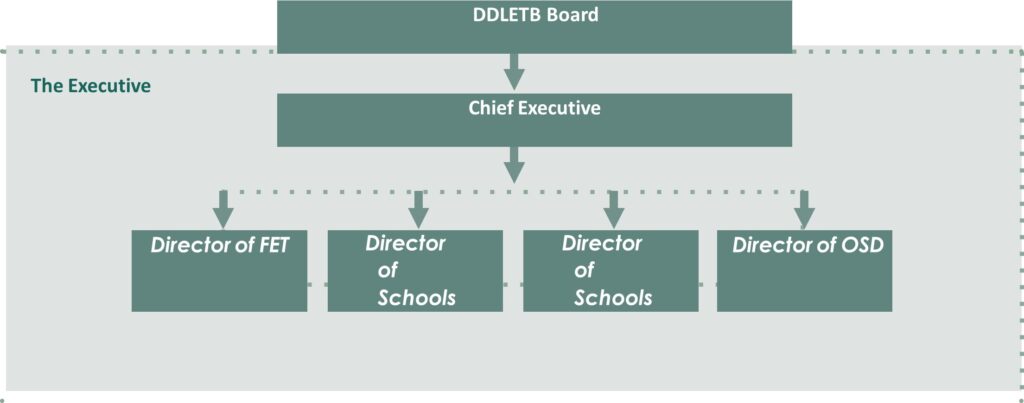
Governance and Management of FET
The Director of FET oversees the delivery of FET programmes and services delivered by the FET Management Team (FMT) and their staff. Chaired by the Chief Executive (CE), the FMT meets regularly to review implementation of strategic and operational issues, and quality assurance is always included on the agenda. See details of the FMT below.
| Further Education and Training Management Team | FET Service |
| Adult Education Services (AES) Adult Education Officers | Adult Education Service North East Adult Education Service North West Adult Education Service South East Adult Education Service South West |
| Further Education College— Principals | Dundrum College of Further Education Stillorgan College of Further Education Sallynoggin College of Further Education Dún Laoghaire Further Education Institute Blackrock Further Education Institute |
| Dual Provision Schools – Principals | Collinstown Park Community College Greenhills Community College Grange Community College Deansrath Community College Mount Seskin Community College St Kevin’s Community College |
| Training Centre Managers | Tallaght Training Centre Baldoyle Training Centre Loughlinstown Training Centre |
| Youthreach Regional Coordinator | Coordinator of 11 Youthreach Centres |
| Quality Assurance Manager | Supports the FMT |
| Strategy and Planning Manager | Supports the FMT |
Governance of FET Quality Assurance (QA)
A governance system has been developed to have oversight of the operation and management of quality assured programmes of further education and training. This governance system aims to provide:
- Oversight that actions have been taken in accordance with the approved quality assurance framework. As such, it seeks to ensure that it is operating within its agreed quality framework, and confirming that this is the case to internal and external stakeholders.
- Identification of themes and trends arising in a given area of business (e.g. a governance unit may be responsible for approving all programme proposals, or all review documentation) with a view to making recommendations towards continuous improvement.
- Opportunities for experienced and impacted individuals to participate in decision-making and to assist in the maintenance and improvement of standards, including through endorsing documentation and receiving reports on follow-up actions. Therefore, it is a key principle of the DDLETB QA governance system that all services should be represented in all committees, wherever possible.
- Assurance for the continuity and quality of teaching, learning and assessment where COVID-19 or other contingency responses are required of DDLETB as provider. This includes the local implementation of QQI emergency procedures, instructions and guidelines, and the ongoing co-ordination, monitoring and review of emergency action plans from both QQI and other statutory agencies, particularly to safeguard both the integrity of assessment, and the health and safety of all stakeholders.
Within this system, the Quality Council is the overarching QA governance unit, consisting of senior management representatives from across all FET services and reports to the ETB’s Senior Management Team. It is supported in its role by committees with responsibility for QA, programmes, course approvals and appeals. Working groups are available to support these committees
2 – Quality Assurance Decision-Making Fora
Corporate Governance
For an overview of the DDLETB FET QA Governance structures, please click here
DDLETB is governed by a Board of twenty-one (21) members. The functions of the Board are either executive or reserved. Executive functions are carried out by the Chief Executive and reserved functions are carried out by the Board. The Chief Executive is responsible for the oversight and management of DDLETB, and is supported in this role by the Senior Management Team which is structured across four separate, but interlinked, divisions: Further Education & Training, Organisation Support & Development, Primary Schools and Youth Services as well as Post-Primary Schools. DDLETB is further supported through the Audit and Risk Committee (ARC), the Finance Committee, School Boards of Management, Youth & Sports Committee and the Youthreach Committee. All committees are composed of Board members and other agreed representatives. A Code of Practice for the Governance of Education and Training Boards (DES, 2019) governs DDLETB.
Development of an ETB-level FET QA governance system
At the time of the amalgamation, DDLETB operated under four (4) separate Quality Assurance (QA) agreements with Quality and Qualifications Ireland (QQI). These were:
- Co. Dublin VEC QA Agreement
- Dún Laoghaire VEC FE Colleges QA Agreement
- Dún Laoghaire VEC Adult Education QA Agreement
- Training Centres Transitional Quality Assurance System.
Since DDLETB’s re-engagement with QQI as a recognised, quality-assured provider, these legacy quality assurance systems are gradually being phased out with the development of a unified Quality Assurance Framework.
FET QA Governance
The Senior Leadership Team has overarching oversight of the provision of all further education programmes of education and training, delegated to the Director of Further Education and Training.

The Quality Council is the overarching institutional-level governance unit, and it reports to the Senior Management Team. It is supported in its role by two further and two working groups. The structure of the governance system is demonstrated in the illustration below.
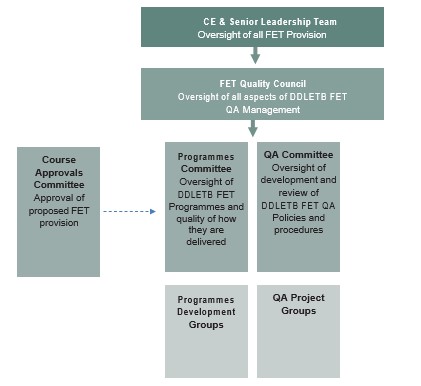
Centre-Level Roles and Governance in FET
The roles and groups that are responsible for the governance of quality at centre-level vary, depending on the service that the individual centre belongs to. The heads of each centre/service report directly to the Director of FET and are supported at ETB level in their delivery of FET programmes by the DDLETB QA Unit. Regular briefings are offered to all centre-level QA staff, and each service has a dedicated support officer within the QA Unit.
FET Structures to Support Quality and the Achievement of DDLETB’s Strategic Goals
FET Management Team
Chaired by the Chief Executive (CE), the FET Management Team consists of College Principals, Training Centre Managers, Dual Provision School Principals, Adult Education Officers, the Regional Youthreach Coordinator and the Managers for Quality as well as Strategy and Planning. This group meets regularly to review implementation of strategic issues, and quality assurance is included on the agenda for each meeting.
Quality Assurance Unit
DDLETB has a dedicated Quality Assurance (QA) Unit, led by the Quality Assurance Manager, and supported by three QA Officers. Each of the QA officers has responsibility for a given service, and specific areas of QA responsibility as outlined above. The QA Unit supports the development of annual Quality Improvement Plans, which are approved by the Quality Council. These plans review the achievement of previously identified quality improvement goals and identify new quality enhancement goals to be achieved.
FET Strategy and Planning Unit
The FET Strategy and Planning Unit is headed by a manager and three development officers, and has responsibility for implementing a range of strategy and policy initiatives and innovations, as well as the use, review and analysis of research and data for business planning and reporting.
3 – Programme Design and Approval
Programme Development
For details of the Course Approval Process, please click here
DDLETB is committed to the delivery of courses and programmes which are relevant to the needs of its learners, the community and the wider society. This may include provision of courses leading to existing programmes, or the development of new programmes leading to new or existing awards.
All programmes leading to Common Awards Standards (CAS) are developed in line with Award Specifications (in the case of major and special purpose awards) or Component Specifications (in the case of minor awards), which have been published by QQI. These specify the learning outcomes which the learner is expected to achieve for a given award. For non-CAS awards, the learning outcomes, articulated as Minimum Intended Programme Learning Outcomes (MIPLOs) and Minimum Intended Module Learning Outcomes (MIMLOs) will be developed and approved as part of the validation process. For the development of non-CAS professional awards, such as is the case for apprenticeships and the new Early Learning and Care awards, the MIPLOs and MIMLOs are developed to be consistent with the broad standards outlined in the relevant Professional Award Type Descriptor.
In 2016, QQI published new Policy and Criteria for the Validation of Programmes of Education and Training (2016), opening up the prospect of the development of new or updated programmes.
When its new QA governance system was being developed, therefore, DDLETB decided to include procedures to oversee the quality assured development of programmes.
Governance of Programme Development
A process has been established to provide governance oversight of programme development, and ensure that all QQI validation policies and criteria have been met (see illustration below).
According to this process:
- Any centre wishing to propose development of a programme must apply to the Programmes Committee. The application to develop a new programme must outline the ways in which the proposed programme will meet the ETB’s strategic goals, local and regional needs and present a business case for its development.
- A Programme Development Working Group (PDWG), consisting of subject matter experts and a curriculum development expert, is appointed, and development commences. As part of the development process, the PDWG must undertake research on national/international best practice, and consult with learners, practitioners and external experts to ensure that the new programme reflects cutting edge knowledge and skills for that field.
- Once developed, the programme is self-evaluated to ensure that all validation criteria, such as learning outcomes; access, transfer and progression opportunities; learner workload etc. are addressed, and that it is compliant with relevant regulatory or professional bodies. For full details, see QQI’s Policy and Criteria for the Validation of Programmes of Education and Training (2016).
Programme Approval
- Thereafter, the Programmes Committee reviews the programme documentation to ensure that all QA procedures were followed. Once they are satisfied that all procedures have been met, and the programme reflects best practice in that field, they approve it for submission to QQI for validation. The QA Unit submits it to QQI through the QHelp portal to apply for validation.
- QQI engage an Independent External Review (IER) Panel, to review the validation application, and to ensure that the programme and its curriculum meet the criteria outlined in QQI’s validation policy.
Programme Submission for Validation
- Once the IER panel is satisfied with the programme, they recommend it to QQI for validation, and it is validated by QQI at the next meeting of its Programmes and Awards Executive Committee (PAEC).
| Procedures to ensure governance oversight of the programme |
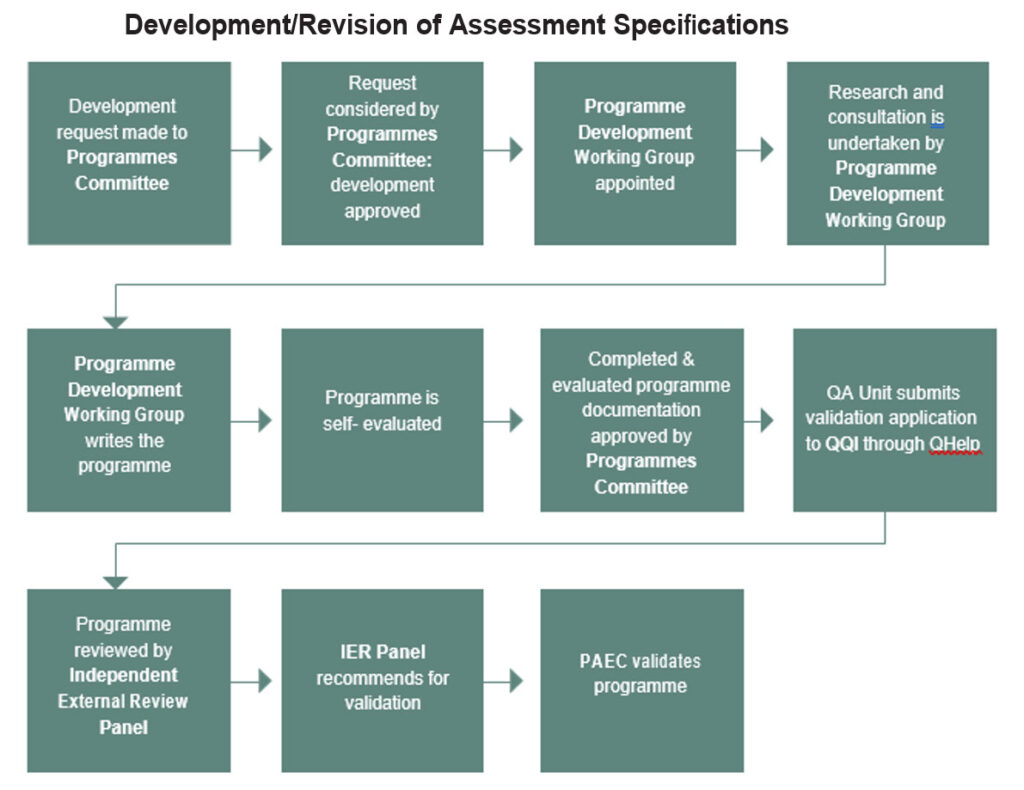
Development/Revision of Assessment Specifications
Training centres use ‘Assessment Instrument Specifications’ (AISs) which were transferred from SOLAS to DDLETB and are used for the assessment of modules. These AISs are held centrally and used across all Training Centres to ensure consistency. They are updated as required47 and governance procedures (click here to access) have been put into place for the revision of these specifications, and the development of new ones.
The Assessment Development Group (ADG) was formed to have oversight of the process; this is an example of a standing Programme Development Working group, comprising a member of the QA Unit and a management representative from each of the training centres. This group reports to the Programmes Committee. To date, 63 new or revised AISs have been developed and approved. The development procedure is outlined in the illustration below:
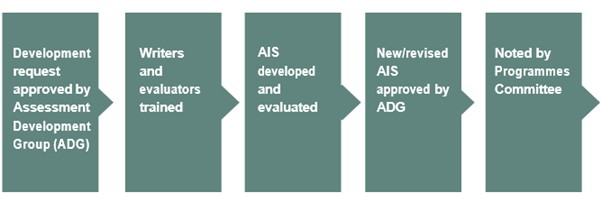
New course development
In addition to developing new programmes for validation, DDLETB makes every effort to ensure that innovative new courses leading to existing programmes are continually updated to meet the needs of learners, employers, industry and all other external stakeholders.
Oversight of new course development
Centres ensure that proposed new courses are developed to meet labour market and community needs. Evidence of the research for this planning is submitted to the Course Approval Committee (CAC) as part of the new course approval application process. The CAC meets monthly, and is chaired by the Director for Further Education and Training, and supported by the Manager for Quality Assurance and the Manager for Planning, Data and Funding.
4 – Programme Delivery and Assessment
The Teaching and Learning Environment
DDLETB’s commitment to teaching and learning is reflected in the tagline “Learn, Achieve, Succeed”. Strategic priorities in the DDLETB Statement of Strategy include providing high-quality education, training and services which are delivered in a supportive environment and deliver the best outcomes possible for learners.
Substantial resources go into recruiting and developing staff and supporting their professional development, acquiring teaching and learning resources and equipment, as well as maintaining and adding to the existing FET infrastructure in order to enable excellent teaching and learning for all.
The Organisation Support and Development (OSD) Director and the OSD team (including the Financial Services Department, HR Department, Buildings Services Department, and ICT Department) work in collaboration with the Director of FET and the FET team to ensure that teaching and learning in DDLETB is sufficiently resourced to deliver on DDLETB’s strategic priorities.
Teaching and Learning Environment: Facilities and Resources
Most vocational programmes have specific resource requirements , and DDLETB is committed to ensuring that learners have access to state-of-the-art facilities which allow them to gain the specific skills relevant to their chosen vocational area. Where QQI award specifications dictate special equipment or resources as part of their specific validation requirements, these are all monitored as part of the course approval process.
ICT Infrastructure
Significant resources have gone into ensuring that all FET colleges and centres have excellent IT facilities which are available for learners’ use, in line with acceptable usage policies. The ICT infrastructure is overseen by the ICT department who have responsibility for upgrades and procurement of IT equipment. A digital device loan scheme has been operational, in order to ensure that learners are not negatively impacted by a digital divide.
Technology Enhanced Learning in DDLETB
DDLETB has long been committed to the promotion of Technology Enhanced Learning (TEL), and staff are supported in their use of TEL by a Digital Leadership Team.
Teaching and Learning Experience: Methodologies
DDLETB offers a wide range of provision: part-time and full-time, uncertified courses as well as certified courses from a variety of awarding bodies, from NFQ Levels 2-6. This range of provision reflects the diversity of learners across DDLETB.
The methodologies employed by teachers/tutors/instructors are learner-centred, and varied, depending on a number of factors, including the learner profile, the level of the course, the contact time available, duration of the course, etc. Staff are encouraged to develop their capacity to deliver in a learner-centred manner, e.g. through the use of Universal Design for Learning, professional development workshops, undertaking further educational qualifications, and availing of good practice guidelines, such as those developed by ETBs nationally and available through the ETBI digital library.
Assessment of Learners
DDLETB is committed to the delivery of high-quality education and training programmes, with quality assured provision and high levels of achievement and certification by learners, as outlined in its Statement of Strategy. Central to the delivery of high-quality education and training, are assessment processes which are transparent, fair, valid, reliable, and consistent for all learners.
Assessment is considered an essential part of an effective teaching and learning process in DDLETB, and a range of systems have been put in place to ensure consistency of assessment across all services and centres.
Consistency of Assessment
Training Centres have a centralised approach to assessment managed by the Training Standards Officers, which ensures that all learners are assessed consistently. The Assessment Instrument Specifications used in the Training Centres were transferred from SOLAS to DDLETB as part of their validated programmes.
FE colleges and centres, Adult Education and Youthreach use locally devised assessments, issued to learners in briefs, which are developed by each teacher/tutor for their class. This facilitates the development of innovative assessments which are relevant to the learner’s context, while still allowing the learner to evidence the learning outcomes.
Assessment Procedure Handbooks
To further support the consistency of assessment across all FET centres, a series of Assessment Procedure Handbooks have been developed and disseminated. These include processes on:
- Reasonable Accommodation
- Assessment Deadlines
- Examinations Guidelines
- Assessment Malpractices
- Assessment Process Appeals
- Assessment Results Appeals
- Secure Storage
Assessment Information to Learners
Learners are informed about how and why they are assessed: this happens both as part of the induction process, and through the assessment briefs that are issued to learners with each assessment. This provides learners with all relevant information regarding the assessment, including marking criteria and assessment deadlines. Brief templates are available to support consistency and transparency, and the Internal Verification process monitors to ensure that they have been issued to learners.
Feedback to learners
The use of formative and summative feedback is considered an essential part of the assessment process, as outlined in QQI’s Quality Assuring Assessment Guidelines for Providers (2013). All learners receive timely formative and summative feedback on their assignments, which is monitored as part of the Internal Verification process.
Supporting Innovation in Assessment
The QA Unit offers Professional Development (PD) workshops, both developed locally and in conjunction with the Further Education and Support Services (FESS)57, in developing assignments, briefs and marking schemes at the appropriate level of the National Framework of Qualifications for specific learner groups. Teachers, tutors and instructors are also strongly encouraged to engage in other professional development opportunities to up-skill in innovative teaching, learning and assessment methodologies.
Recognition of Prior Learning: in the Early Learning and Care Programme
Recognition of Prior Learning (RPL) is a process for recognising previous learning experiences, whether they were acquired through formal education, work experience, or other means.
The DDLETB Interim RPL Policy for Early Learning and Care (ELC) Awards is for use pending the development and approval of an RPL Policy and related procedures. This interim policy will cease to be operational once DDLETB’s RPL Policy has been approved.
Download Interim RPL Procedures
The ELC RPL toolkit is intended to provide a resource for FET practitioners when they are examining claims for recognition of prior learning towards the following qualifications:
· Level 5 certificate in Early Learning and Care programme 5M21473
· Advanced Certificate in Early Learning and Care programme 6M21471
Download the RPL toolkit here.
Authentication of Assessment
All QQI assessment, whether it takes place in centre, or on work placement, is internally verified and externally authenticated as per DDLETB policies and procedures. As part of the assessment process, tutor packs are submitted along with learner portfolios, and the Internal Verification (IV) and External Authentication (EA) processes monitor to ensure that assessments have been planned, that the procedures outlined above have been followed, and that the learning outcomes have been assessed appropriately.
Reports are generated from the IV and EA processes, which highlight areas for improvement as well as good practice identified. These reports are considered by the Results Approval Panel (RAP) who, as part of their overall review of certification, identify areas for future improvement. The concept of continuous improvement is particularly important. Therefore, feedback from the IV and EA reports is given to teachers/tutors/instructors, so as to complete a cycle of continuous enhancement. This feedback is variously given as individual feedback for an individual staff member, or collated feedback from the entire centre. Some centres use staff meetings to discuss feedback.
All reports are forwarded to the QA Unit where they are collated and anonymised, to be considered by the relevant governance groups. This collated feedback is also circulated to all centres so as to share the learning from across the entire ETB. All non-QQI assessment must comply with relevant assessment criteria and processes of that awarding body, and is currently managed at centre level, and in line with the awarding body criteria.
5 – Student Lifecyle
Admissions
Prospective learners can access FET courses directly from centres or through the online Further Education and Training Course Hub. They can also be referred to courses by the Department of Social Protection (DSP) Intreo.
When applying directly, learners may be supported by the various FET Guidance, Information and Recruitment services, such as the Adult Education Guidance and Information Services (AEGIS), which provides access to a quality, free, impartial, confidential and professional guidance counselling service. Within the training centres, Recruitment Services also play an important role in supporting learners to access FET courses, while, the Guidance Counsellor or Course Coordinators in Further Education Colleges and schools support learners to apply for courses within the centres.
Further Education and Training Course Hub
Learners may also access courses though the Further Education and Training Course Hub (FETCH). This is a website providing details of FET courses delivered in ETBs in Ireland; learners can find courses and register for them through that website, or else they can engage directly with a centre and be supported to register on the FETCH site when they engage directly with a centre.
Becoming a learner or trainee in DDLETB: our admissions processes
Typically, prospective learners attend an interview to assess their suitability for the course for which they are applying. The admissions interview is usually conducted by the course coordinator or an experienced teacher on the course. The purpose of the interview is to assess whether the learner meets the entry criteria for the course where these exist, or to facilitate the learner to find the course most suitable for their needs. Other, course specific, information is given to learners upon entry to the course. The DDLETB Admissions Appeals Policy outlines procedures for appeal for those learners who are not successful in their application onto a course.
It is expected that any learner seeking to access a particular course would have the knowledge, skills and competencies at the level of the National Framework of Qualifications indicated in the prospectus for access on to that programme. Where the learner does not have a major award at the level indicated for access, life skills or work experience may be taken into account, as long as they possess the skills which would be required to allow them to participate successfully in the course. It is the responsibility of the course coordinator or other identified staff member, to determine that a prospective learner has the knowledge, skill and competence to successfully participate on the course.
Depending on the nature of the course, a learner whose native language is not English may be asked to complete the Cambridge Placement Test or other test, and achieve the level indicated in the programme descriptor required to successfully participate in the course,
Please contact the centre directly for further information about admissions procedures and course-specific admissions requirements.
DDLETB is currently developing a policy to support the Recognition of Prior Learning (RPL).
Induction
On starting a course in DDLETB, learners have an induction session/s in which they receive general information about the centre, as well as course-specific information such as modules to be covered, the course calendar and timetable, out-of-centre activities, assessments and assessment deadlines, DDLETB attendance policies and procedures, assessment policies and procedures, supports available to learners, SUSI grants, code of conduct, complaints procedure and other relevant information.
Throughout the course, learners are kept informed of activities and assessment requirements through briefs distributed in class, course notice boards, and where available, through a Virtual Learning Environment.
The Learning Experience and the Environment
DDLETB is committed to creating within its centres, a learning environment which in its physical, social, cultural and intellectual aspects allows learners to have a holistic learning experience, facilitating them to develop both personally and academically.
Learners engaging on a course will be respected and treated in an equitable manner, in line with DDLETB’s commitment to equality, as promoted through the ETB’s Equality Development Group. Where possible or appropriate, centres organise activities to support a positive social and cultural learning environment through activities such as field trips or guest speakers. For example, learners in the further education colleges have access to activities organised by their college’s student council, and the DDLETB Student Society organises activities where students from all DDLETB FE colleges and centres can meet together and engage in social and cultural activities.
Technology Enhanced Learning (TEL)
DDLETB is committed to providing an ongoing and enhanced investment in technology-enhanced learning to support innovative teaching and learning practices. Actions include supporting the creation and sharing of digital resources for use in the classroom, use of virtual learning environments (VLEs), such as Moodle to support the learning experience, building staff capacity through CPD; expanding the ICT infrastructure, and developing TEL Communities of Practice and networks.
Quality Assuring Work Experience and Work Placement
At DDLETB we believe that work experience is a valuable part of the learning experience, allowing learners to get a taste of the realities of working in their chosen career. Therefore, most courses leading to a major award include a Work Experience module with a compulsory work placement.
DDLETB is committed to ensuring that the work-based learning environments that learners experience as part of their work placements are appropriate, safe, and not exploitative of the learners that engage in them.
Assessment
For more information about assessment in DDLETB, please see Programme Delivery and Assessment.
Giving Feedback on the Learning Experience
Learner feedback is an essential element to the life cycle of a course within DDLETB. Feedback is sought for most courses through mid-term and end-of-term evaluations, and the information gathered can be used to address issues arising throughout the course, and informs future iterations of the course, e.g. with respect to module choice etc., as well as new course development. In addition, learners can raise any concerns or feedback they may have about the course, with either the course teacher or course coordinator at any time between the formal feedback opportunities.
Learner Grievances
Where learners have complaints, they are expected, in the first instance, to address it with the person concerned. If still unsatisfied, they may take their concerns to the course coordinator, and thereafter may appeal to the senior management team within the centre.
Where learners have grievances of a non-academic nature which are escalated to ETB-level, these are handled by the DDLETB Corporate Services Department.
Progression
When you have completed your course, you may be planning to go into employment, or you may be planning the next step of your educational journey. Many courses have identified progression opportunities, and some even have progression agreements in place with further or higher education providers, offering preferred entry to their learners. For more information regarding progression opportunities when you have completed your course, please see the course website, or contact the course coordinator directly.
6 – Teaching Staff
Staff recruitment
Click here for details of DDLETB HR policies.
DDLETB is committed to recruiting staff who have the skills and qualities necessary to carry out their roles, in a fair and consistent manner in line with the DDLETB Human Resources (HR) Recruitment and Selection Policy and process. Vacancies are advertised on the DDLETB website, and on other sites such as www.etbvacancies.ie, with job specifications and required competencies clearly communicated. A formal interview process for shortlisted candidates is conducted in line with DDLETB HR policies and procedures, and successful candidates must be garda vetted. All interview panel members are trained in competency-based interview techniques. Staff with teaching contracts in further education colleges/centre and schools are registered with the Teaching Council and are Garda Vetted by the Teaching Council to work as teachers. Robust procedures were developed to support online recruitment processes following the COVID-19 lockdowns, and over 900 new staff members were recruited remotely during this time.
A centralised induction process takes place for newly appointed teachers. The sessions cover an overview of the organisation, supports offered to teachers, and an overview of supports offered by various departments of the organisation.
Staff recruitment: Contracted Trainers
A framework of pre-qualified contractors is utilised to deliver Contracted Training contracts. Contractors must have systems in place for the quality assured delivery of curriculum, assessment and testing, in line with the framework agreement. Training Specifications are agreed prior to the delivery of a course, outlining course modules, certification, delivery methodologies, and tutor minimum pedagogical and professional experience to facilitate delivery. It is the responsibility of the contractor to recruit relevant personnel required to manage, administer and deliver courses in agreement with framework obligations.
Staff Recruitment: Community Training Providers
Community Training Providers are bound by service level agreements and contracts when delivering training programmes funded by DDLETB. These agreements are supplemented by Operational Guideline documents. The second provider is responsible for the recruitment, training and development of all staff in line with operational guidelines. All trainers and tutors who have responsibility for the delivery of any element of training must meet specified qualification criteria. Training Centres have responsibility for the oversight of community training providers.
Professional Development within DDLETB
DDLETB has Professional Development (PD) Coordinator with responsibility for the development and delivery of a programme of professional development opportunities for FET staff. These opportunities include an extensive range of professional development workshops and training opportunities, as well as externally delivered certified courses. In addition, staff members may source their own professional development opportunities. Employees who participate in a certified further education/third level course which is directly related to their work may avail of the “Refund of Fees Scheme”. The PD Coordinator undertakes annual surveys of staff training needs, to inform the following years PD Calendar.
Information regarding Professional Development (PD) opportunities are published on the PD Hub, a SharePoint site which allows FET staff members to register for PD workshops and courses, as well as providing access to a range of short video training courses, and links to free, external training courses.
7 – Resources and Support
Resources and Support
When learners first apply to any DDLETB FET centre, they are encouraged to disclose any special needs or requirements that they may have for appropriate supports or reasonable accommodation to be put in place to maximise their experience of learning in DDLETB.
Every reasonable effort is made to support learners with differences, either before admission or once they have started on their course. These might include differences in prior learning or experience, maturity, differing capabilities amongst others. However, it must be noted that it may not be possible to meet all support needs withing the physical, financial and staffing restrictions within which the centre, and DDLETB must operate. Some of the resources and supports which may be available are outlined below.
Reasonable Accommodation
A Reasonable Accommodation Handbook is available in all FET centres, which outlines the range of accommodations that may be available to learners under the appropriate circumstances.
Disability Supports
DDLETB welcomes applications from all learners, including those with disabilities, special educational needs and medical conditions. In FE colleges and centres, the guidance counsellors play a critical role in supporting learners to access courses, or seek additional supports for disabilities or other additional needs. In addition to the supports outlined above, learners in FE colleges and centres may also avail of SOLAS’s ‘Fund for Students with Disabilities’ (FSD).
Guidance, Information and Recruitment Services
Learners may be supported by the various FET Guidance, Information and Recruitment services, such as the Adult Education Guidance and Information Services (AEGIS), which provides access to a quality, free, impartial, confidential and professional guidance counselling service. Within the training centres, Recruitment Services also play an important role in supporting learners to access FET courses, while, the Guidance Counsellor in Further Education Colleges and schools support learners to apply for reasonable accommodations, and explore progression opportunities. These services will provide learners with information regarding well-being and mental health supports.
Literacy, and numeracy supports
The Adult Education Service provides literacy and numeracy supports in small groups or one-to- one tuition to adults with basic educational needs. These may include uncertified or certified classes at Levels 2 and 3 of the National Framework of Qualifications. In some cases, AES tutors will also provide literacy, numeracy, or study support skills to learners in other services.
8 – Self-Evaluation, Monitoring and Review
DDLETB is committed to engaging in self-evaluation, monitoring and review to identify existing effective practices in order to maintain and build on them, while identifying areas for improvement and potential risks to DDLETB’s quality assured procedures. Central to that process is the series of self-evaluation and external evaluation of its QA assurance processes that DDLETB regularly undertakes with QQI.
Evaluation of Quality Assurance in DDLETB
In 2017, DDLETB undertook an Executive Self-Evaluation, in preparation for its reengagement process with QQI. The findings of this self-evaluation process were published in an Executive Self-Evaluation Report, which allowed the ETB to explore its strengths, identify areas for improvement, and articulate, as an organisation, the approach to quality enhancement which it wished to adopt. The Executive Self- Evaluation became DDLETB’s first formal engagement in its Quality Cycle with QQI (see illustration). Thereafter, annual QIPs were developed, approved by the Quality Council and submitted to QQI. These inform the annual Quality Dialogue Meetings between DDLETB and QQI.
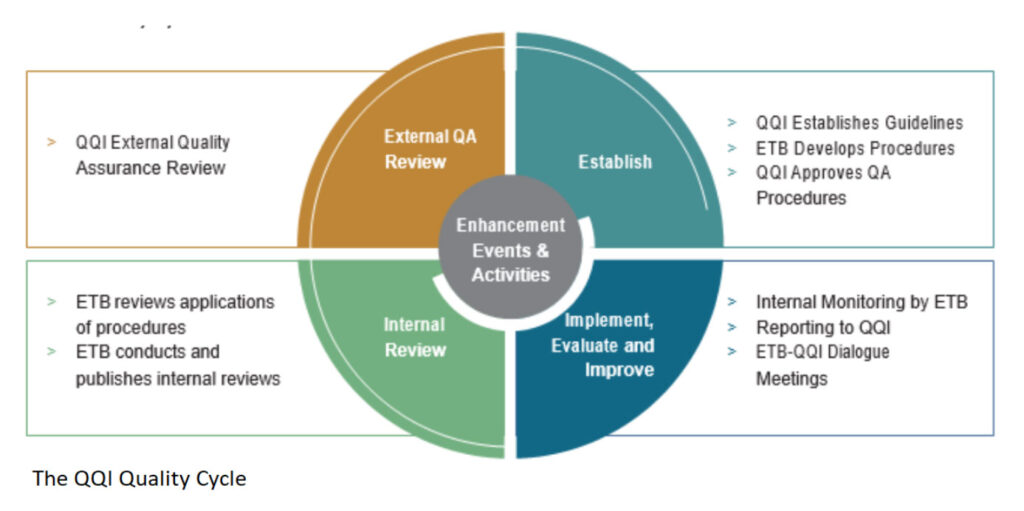
In 2021, DDLETB engaged in an extensive Inaugural Review process with QQI, which commenced with an in-depth self-evaluation of its quality assured processes and procedures, against the QQI Core QA Guidelines. This was followed by a week-long external review panel visit, and the publication of an external Quality Review Report in 2022. DDLETB will continue to engage in annual Quality Dialogue meetings with QQI.
Internal Monitoring
DDLETB utilises a range of processes to monitor the quality of all FET provision.
- The Internal Verification (IV) and External Authentication (EA) processes provide essential internal monitoring functions with regards to the assessment and certification of programmes of education and training within a centre. The IV process monitors that all QA and administrative procedures relating to assessment (such as the totalling and recording of marks) have been correctly completed, while the EA process provides external confirmation that IV has been undertaken, and that the marks awarded are in line with national standards. Reports from these processes are reviewed and evaluated at centre level by the Results Approval Panel, which allows the senior management team and those with responsibility for QA in the centre to monitor QA errors and their remediation, as well as to identify areas of strength and those needing improvement.
- The Results Approval Panel (RAP) process provides the opportunity to monitor a number of quality indicators, such as certification, appeals and QA procedural error rates, as well as to monitor the extent to which past actions identified for improvement have been implemented. In considering the issues raised in the IV and EA reports, the RAP has the opportunity to identify areas for local improvement or escalate issues to DDLETB level if they present a significant risk to DDLETB’s quality assured provision. As such, the RAP plays an essential early warning role in the QA systems.
- All centres monitor their provision by eliciting feedback from learners, which provides useful data on learner satisfaction rates, as well as on issues that may arise in the classroom but are not captured in IV or EA reports. This is done as part of the continuous Quality Improvement Cycle. Additionally, Programme Improvement Plans are used in some centres.
9 – Information Management
Click here for details of DDLETB’s Data Management Policies
DDLETB is committed to ensuring that reliable information and data is available to support informed decision-making, and that all data is processed in compliance with data protection legislation.
General Data Protection Regulation (GDPR)
DDLETB complies with GDPR and the Data Protection Acts 1988-2018 with respect to the processing of personal data, including its collection, storage, organisation and retention. Following the introduction of GDPR regulations, all DDLETB staff are required to complete GDPR training.
A Document Retention Schedule ensures the secure storage of learner records and assessment materials, the DDLETB Corporate Services department developed, to which all centres adhere.
Data Management Systems
DDLETB uses a wide range of data management systems and platforms to manage and evaluate the data used for key administrative and operational functions.
Access to databases in by named and authorized personnel only, for the purposes of data entry and for reporting purposes, as appropriate, at local centre, DDLETB or national level.
Learners are informed of their rights to request data pertaining to their individual records.
10 – Stakeholder Engagement
DDLETB engages with a wide range of external stakeholders in order to ensure that the programmes of education and training that it offers are appropriate to the needs of its learners and facilitate their progression into education and employment. These relationships are subject to monitoring at centre level and oversight at governance level. Monitoring reviews incorporate financial reviews, training delivery reviews and an analysis of stakeholder feedback. Key performance indicators such as learner numbers, retention, and certification all provide key information for the review process. A risk assessment and management approach to assigning resources to the day-to-day monitoring of service provision is implemented.
Peer Relationships Within the Education and Training Community
Community Education Provision
The Adult Education Services (AES) in DDLETB engage extensively a wide range of community and voluntary groups to support the provision of relevant programmes of education and training to learners in their own communities. These frequently target groups at risk of marginalization and are based in disadvantaged areas. These partnerships are governed by Service Level Agreements.
Second Providers
The DDLETB training centres support the delivery of training in the community through their engagement with Community Training Centres (CTCs), Local Training Initiatives (LTIs) Specialist Training Providers (STPs) and Justice Workshops. Adherence to DDLETB QA Policies and Procedures is an integral part of the contractual arrangements. Community Development Officers monitor these providers at regular intervals.
Contracted Training Providers
Procedures are in place for the tendering and awarding of contracts to Second Providers. Contracted Training Providers are required to adhere to DDLETB QA Policies and Procedures, with Internal Verification (IV) and External Authentication (EA) processes being monitored through the Results Approval Panel (RAP) process. Monitoring of all other aspects of the programme are conducted by the Contracted Training Officers.
Employer Engagement
DDLETB has a dedicated Enterprise Engagement Manager who liaises with businesses to identify their training needs. Once this process is completed, DDLETB can offer access to an existing suite of high-quality education opportunities or develop a customised programme in conjunction with an employer to meet the required training needs.
11 – Engagement with Other Bodies
DDLETB engages with partners and stakeholders to ensure that the quality of provision is informed by stakeholder needs, feedback and evaluation. Key strategic partnerships and collaborations are built and maintained for public accountability and transparency, as well as to advocate for, and secure, the necessary resources and supports for a quality-led provision.
National Collaborations and Partnerships
SOLAS
SOLAS is the national agency with responsibility to fund, coordinate and monitor FET in Ireland. DDLETB has developed a progressive working relationship with SOLAS which is crucial for the development of FET provision and the implementation of the national FET Strategy 2020 -2024 ‘Transforming Learning’. Annual Plans are submitted by DDLETB that set priorities and goals for the delivery of all FET provision. In addition, SOLAS has statutory responsibility for craft apprenticeships under the Industrial Training Act 1967 for the administration and management of the Craft Apprenticeship programmes.
Quality and Qualifications Ireland (QQI)
QQI is the national awarding body for further education and training. As outlined in the Qualifications and Quality Assurance (Education and Training) Act, 2012, QQI is responsible for maintaining and implementing the National Framework of Qualifications, determining award standards, publishing QA guidelines, and validating programmes of education and training. As a recognised provider since 2018, DDLETB delivers an extensive suite of QQI awards in line with the QA policies and procedures agreed with QQI.
Education and Training Boards Ireland (ETBI)
ETBI is the national representative body established to collectively represent 16 Education and Training Boards (ETBs) and promote their interests as per the Education and Training Boards Act 2013. Further Education and Training (FET) Support is one of three directorates within ETBI responsible for supporting the ETB sector across five strategic areas of Work-based Learning, Quality, Active Inclusion, Strategy and Policy and Planning, Resources and Reporting. DDLETB is currently represented on the Chief Executives’ Forum, the Directors of FET Forum, as well as being represented on the Active Inclusion Strategy and the Quality Strategy groups by the Director of FET. The FET management team represent DDLETB on several FET Management and Coordination Networks convened by ETBI, including the Training Centre Manager Network, Principals Network the Adult Education Officer Network and the Quality Network. . DDLETB collaborates with neighbouring ETBs on many innovative and collaborative projects.
Department of Social Protection (DSP)
The Department of Social Protection is a governmental department, tasked with administering Ireland’s social welfare system. It oversees and promotes active participation and inclusion in society through the provision of income supports, employment services and other social services. Collaboration and partnership between DDLETB and the DSP is facilitated by a formal referral protocol and regular regional network meetings. Local and regional liaison with the DSP Intreo offices also ensure effective consultation for the planning and delivery of targeted FET provision or target cohorts of DSP clients/learners in each DSP regional area.
Leargas
Leargas is a national agency that manages international mobility and exchange programmes in education, youth, community work and vocational education and training under the EU funding programme called ‘Erasmus +’. DDLETB colleges and centres participate in international exchange programmes in both learner and staff mobility (known as KA1 projects) and strategic partnerships with the EU partners (known as KA2 projects).
AONTAS
AONTAS are the national Adult Learning Organisation advocating for the rights of adult learners in Ireland to quality lifelong learning. DDLETB works closely with national agencies that promote the learner’s voice. In 2021, DDLETB worked closely with AONTAS to capture FET learners’ feedback on the quality of their learning experience as part of the consultation for the Inaugural Review of Quality Assurance.
NALA
NALA is the National Adult Literacy Agency which works to raise awareness of literacy services, and advance literacy policy through research and advocating for learners with literacy difficulties. A formal referral protocol is in place between the Adult Education Services, DDLETB and NALA to help ensure a positive experience for learners referred by NALA.
Regional Skills Forum
DDLETB is an active participant in the Regional Skills Forum33 which focuses on the skills and development of the region through industry collaboration and engagement. This network provides an opportunity for employers and the education and training system to work together to meet the emerging skills needs of the region. DDLETB works in partnership with other industry bodies including the IDA-Ireland, Enterprise Ireland, IBEC and Dublin Chambers of Commerce, focusing on upskilling and reskilling initiatives for employers and employees in the Dublin region.
The Education & Training Provider Group (ETPG) within the Dublin Regional Skills Forum has drawn up a single all- encompassing Memorandum of Understanding (MoU) to collaborate between the various institutions within Dublin Regional Skills Forum.
Fingal Skills Strategy Group (FSSG)
FSSG Implementation Group was set up to deliver the objectives of the Fingal Skills Strategy, which was published in 2019. The implementation group brings together representatives from education and training providers, employers and industry, government agencies and Fingal County Council to ensure that Fingal has the right skills for the future. DDLETB is an active partner of this group ensuring that training provision aligns with industry needs.
County Councils
There are three county councils in DDLETB’s administrative area. DDLETB plays an important role in relation to the training and education objectives or actions in the Local Economic and Community Plans (LECPs) 2016-2021 of Dún Laoghaire-Rathdown, Fingal and South Dublin County councils. DDLETB is also represented on the Local Community Development Committees (LCDCs) of each local authority and engages regularly with each council’s Local Enterprise Office (LEO).
DDLETB chairs the Employment, Education and Training Pillar Group of the Our Balbriggan 2019- 2025 Rejuvenation Plan in Fingal, with Fingal County Council.
Local Development Companies
There are three Local Development Companies in the DDLETB catchment area: Empower, South Dublin Partnership and Southside Partnership. DDLETB is represented on the Board of Management of each of these companies. DDLETB also has representatives on Social Inclusion and Community Activation Programme (SICAP) Oversight Committees and supports labour market activation provision.
12 – Collaboration with Partners, Other Providers and Awarding Bodies
Coordinating and Collaborating Provider Relationships
DDLETB is a Collaborating Provider in a number of apprenticeships. These apprenticeships are all managed under the QA of the Coordinating Provider, as listed in the table below. The nature of the Coordinating/Collaborating Provider relationship, and the roles and responsibilities of each party are outlined in the Quality Assurance Procedures for the apprenticeship as validated by QQI, and the Coordinating Provider is responsible for monitoring delivery of the apprenticeship in DDLETB.
| Coordinating Provider | Apprenticeships |
|---|---|
| Crafts Apprenticeships | |
| SOLAS | Carpentry & Joinery |
| Construction Plant Fitter | |
| Electrical Instrumentation | |
| Electrical | |
| Heavy Vehicle Mechanic | |
| Motor Mechanic | |
| Wood Manufacturing and Finishing | |
| 2016+ Apprenticeships | |
| Accounting Technician Ireland (ATI) | Accounting Technician |
| Fasttrack Into Information Technology (FIT) | ICT Associate Apprenticeship in Network Engineering |
| FIT | ICT Associate Apprenticeship in Software Developer |
| FIT | ICT Associate Apprenticeship in Cybersecurity |
| Limerick Clare ETB | |
Higher Education (HE) Institutions
DDLETB Further Education colleges and centres have developed close relationships with a number of Higher Education Institutions (HEIs), to facilitate progression options for their learners. The Higher Education Links Scheme (HELS) allows learners to use their QQI Level 5 or 6 award to apply through the CAO to the first year of a Higher Education programme. Furthermore, a number of FE colleges/centres have established formal and informal links or agreements with HEIs both in the Dublin region, and further afield. In many cases, Memoranda of Understanding (MoUs) are in place to facilitate advanced entry into Year 2 of a specific HE programme.
Other Awarding Bodies
In addition to an extensive suite of courses leading to QQI awards, DDLETB offers a range of courses leading to awards offered by other certifying bodies. Some of those awards are listed in the table below:
| Awarding Body |
|---|
| Amazon Web Services (AWS) |
| Approved EN Certifying Body |
| Accounting Technicians Ireland (ATI) |
| ALEXOS |
| City & Guilds |
| Computer Technology Industry Association (CompTIA) |
| Department of Education |
| Environmental Health Association Ireland (EHAI) |
| Irish Computer Society (ICS skills) |
| Institute of the Motor Industry |
| International Therapy Examination Council (ITEC) |
| Life Insurance Association Ireland |
| Microsoft |
| Pearson |
| Pre-Hospital Emergency Care Council (PHECC) |
| Road Safety Authority (RSA) |
| Road Transport Industry Training Board (RTITB) |
| Speciality Coffee Association |
| Vocational Training Charitable Trust (VTCT) |
| Total |
DDLETB also offers a range of uncertified courses to learners. These courses are delivered through the Community Education programme and Adult Literacy Service in the Adult Education Services and are focused on encouraging priority cohorts27 to engage in education and training.
13 – Provision and Use of Public Information
Higher Education (HE) Institutions
DDLETB uses a variety of communication channels to inform potential learners and other stakeholders about DDLETB and the range of provision that it has to offer. These include the DDLETB and centre-specific websites, social media, newsletters and eZines, brochures, and a variety of other communication methods. DDLETB list most of its courses on www.fetchcourses.ie, although certain courses, targeted at specific learners, are not listed on the site.
Websites and Social Media
DDLETB has a corporate website (www.ddletb.ie), which includes information about the ETB, and provides links to all of its services and centres. This website also uses a feed from www.fetchcourses.ie to provide a dynamic listing of FET courses open for applications. In addition, most centres have their own websites, with information about the courses they offer, progression opportunities, eligibility criteria and other relevant information such as learner supports. The three training centres have developed a common approach to branding, and publicise their provision through the www.dublintrainingcentres.ie site.
In addition, most centres have a social media presence on platforms such as Twitter, Facebook, Instagram and YouTube, where they provide information about the centre and service, new courses and initiatives. A social media strategy for DDLETB is currently being developed.
